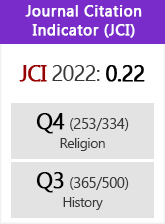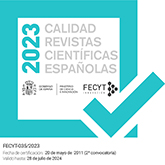Juan of Segovia’s Translation of the Qur’ān
DOI:
https://doi.org/10.3989/alqantara.2014.019Keywords:
John of Segovia, 15th Century, Latin translation, Qur’ān, Theologians, Crusade, Yça Gidelli, Council of Basel, Robert of Ketton, Interreligious communicationAbstract
John of Segovia (1393-1458) is together with Nicolaus Cusanus one of the most important theologians of the 15th century. His struggle for peace and consensus during the council of Basel culminated in his engagement for interreligious communication in the last years of his life. After the fall of Constantinople in 1453, he prepared a new approach towards the Islam. Not crusade, but interreligious communication based on thorough knowledge of the religion of the other should result in peace, either through converting the other or at least convincing him to stop warfare. Therefore John of Segovia initiated a new translation of the Qur’ān into Spanish, which he himself translated into Latin. This article outlines the history of this famous project and illustrates its main characteristics with examples taken from fragments of this first polyglot translation of the Qur’ān.
Downloads
References
Bibliander, Theodor (ed.), Machumetis Saracenorum principis, eiusque successorum vitae, doctrina, ac ipse Alcoran, Basle, n.p., 1550.
John of Segovia, De gladio divini spiritus in corda mittendo Sarracenorum, Ulli Roth (edition und deutsche Übersetzung mit Einleitung und Erläuterungen), Wiesbaden, Harrassowitz, 2012, Corpus Islamochristianum, Series latina 7, 2 Bände.
John of Segovia, Epistula ad Johannem Cabilonensem episcopum, in Darío Cabanelas Rodríguez (ed.), Juan de Segovia y el problema islámico, Madrid, Universidad de Madrid-Facultad de Filosofía y Letras, 1952.
John of Segovia, Epistula ad Nicolaum de Cusa, in Davide Scotto (ed.), "Via pacis et doctrine". Le Epistole sull' Islam di Juan de Segovia, Diss. masch. Florenz 2012, S. 2-81 (partly transcribed in Darío Cabanelas Rodríguez, Juan de Segovia y el problema islámico, Madrid, Universidad de Madrid-Facultad de Filosofía y Letras, 1952, pp. 303-310).
John of Segovia, Liber de magna auctoritate episcoporum in Concilio generali, R. de Kegel (ed.), Fribourg, Universitätsverlag Freiburg Switzerland, 1995, Spicilegium Friburgense 34.
John of Segovia, Praefatio in translationem, in José Martínez Gázquez (ed.), "El prólogo de Juan de Segobia al Corán (Qur'ān) trilingüe (1456)," Mittellateinisches Jahrbuch, 38 (2003), pp. 389-410 (partly transcribed in Darío Cabanelas Rodríguez, Juan de Segovia y el problema islámico, Madrid, Universidad de Madrid-Facultad de Filosofía y Letras, 1952, pp. 279-302).
John of Segovia, Replica magne continencie ad Iohannem Cabilonensem episcopum, in Davide Scotto (ed.), "Via pacis et doctrine". Le Epistole sull' Islam di Juan de Segovia, Diss. masch. Florenz 2012, 82-281 (partly transcribed in Darío Cabanelas Rodríguez, Juan de Segovia y el problema islámico, Madrid, Universidad de Madrid-Facultad de Filosofía y Letras, 1952, pp. 331-335).
Pseudo Pedro Pascual, Sobre la se[c]ta mahometana, Fernando González Muñoz (ed.), Valencia, Universitat, 2011.
Yça Gidelli, Epistola ad Johannem de Segovia (24.4.1454), transcribed in Darío Cabanelas Rodríguez, Juan de Segovia y el problema islámico, Madrid, Universidad de Madrid-Facultad de Filosofía y Letras, 1952, pp. 273-277; ed. with English translation in Gerard A. Wiegers, Islamic Literature in Spanish and Aljamiado. Yça of Segovia (fl. 1450), his Antecedents and Successors, Leiden, Brill, 1994, pp. 230-235.
Bobzin, Hartmut, Der Koran im Zeitalter der Reformation. Studien zur Frühgeschichte der Arabistik und Islamkunde in Europa, Beirut-Stuttgart, Steiner Verlag, 1995, Beiruter Texte und Studien 42.
Bündgens, Anna et al, "Die Errores legis Mahumeti des Johannes von Segovia," Neulateinisches Jahrbuch, 15 (2013), pp. 215-248.
Burman, Thomas, Reading the Qur'ān in Latin Christendom, 1140-1560, Philadelphia, University of Pennsylvania Press, 2007. http://dx.doi.org/10.9783/9780812200225
Castells Criballés, Margarita, "Alguns aspectes formals de la traducció llatina de l'Alcorà de Robert de Ketton (c. 1141-1143) i la seva relació amb el text original àrab," Faventia, 29, 3 (2007), pp. 79-106.
Cecini, Ulisse, Alcoranus latinus. Eine sprachliche und kulturwissenschaftliche Analyse der Koranübersetzungen von Robert von Ketton und Marcus von Toledo, Berlin, LIT Verlag, 2012, Geschichte und Kultur der Iberischen Welt 10.
Glei, Reinhold, "Arabismus latine personatus. Die Koranübersetzung von Ludovico Marracci (1698) und die Funktion des Lateinischen," Jahrbuch für Europäische Wissenschaftskultur, 5 (2009-2010), pp. 93-115.
Hamann, Florian, Das Siegel der Ewigkeit. Universalwissenschaft und Konziliarismus bei Heymericus de Campo, Münster, Aschendorff Verlag, 2006, Buchreihe der Cusanus-Gesellschaft 16.
Hamann, Florian, "Der Koran als ekklesiologische Autorität bei Heymericus de Campo († 1460)," Freiburger Zeitschrift für Philosophie und Theologie, 50 (2003), pp. 150-162.
Hernández Montes, Benigno, Biblioteca de Juan de Segovia. Edición y comentario de su escritura de donación, Madrid, CSIC-Instituto Francisco Suarez, 1984, Bibliotheca Theologica Hispana, Serie 2, Tom. 3.
Hernández Montes, Benigno, "Obras de Juan de Segovia," in Repertorio de Historia de las Ciencias Eclesiásticas en España VI, Salamanca, 1977, pp. 267-347.
López-Morillas, Consuelo, El Corán de Toledo. Edición y estudio del manuscrito 235 de la biblioteca de Castilla-La Mancha, Gijón, Trea, 2011, Bibliotheca Arabo-Romanica et Islamica 5.
López-Morillas, Consuelo, "Secret Muslims, Hidden Manuscripts: Spanish Translations of the Qur'ān from the Fifteenth to the Seventeenth Centuries," in R. Glei (ed.), Frühe Koranübersetzungen. Europäische und außereuropäische Fallstudien, Trier, WVT Wissenschaftlicher Verlag Trier, 2012, pp. 99-116.
Madrigal Terrazas, Jésus S., El pensamiento eclesial de Juan de Segovia (1393-1458). La gracia en el tiempo, Madrid, Universidad Pontificia Comillas, 2004, Serie 1, Estudios 90.
Piccolomini, Enea Sylvio (Pío II), De Europa, A. van Heck (ed.), Vatican City, Biblioteca Apostolica Vaticana, 2001, Studi e testi 398.
Roth, Ulli and Glei, Reinhold, "Die Spuren der lateinischen Koranübersetzung des Juan de Segovia – alte Probleme und ein neuer Fund," Neulateinisches Jahrbuch, 11 (2009), pp. 109-154.
Roth, Ulli and Glei, Reinhold, "Eine weitere Spur der lateinischen Koranübersetzung des Juan de Segovia," Neulateinisches Jahrbuch, 13 (2011), pp. 221-228.
Scotto, Davide, "'De Pe a Pa'. Il Corano trilingue di Juan de Segovia (1456) e la conversione pacifica dei Musulmani," Rivista di Storia e Letteratura Religiosa, 48, 3 (2012), pp. 515-577.
Scotto, Davide, "Inseguire l'islam tra memoria e teologia. Spigolature su Juan de Segovia intorno al 1427," in Daniela Rando, Paolo Cozzo e Davide Scotto (eds.), Ottant'anni da maestro. Saggi degli allievi offerti a Giorgio Cracco, Roma, Viella, 2014, pp. 101-139.
Scotto, Davide, "Via pacis et doctrine". Le Epistole sull' Islam di Juan de Segovia, Diss. masch. Florenz, 2012.
Wiegers, Gerard A., Islamic Literature in Spanish and Aljamiado. Yça of Segovia (fl. 1450), his Antecedents and Successors, Leiden, Brill, 1994, Medieval Iberian Peninsula Texts and Studies 8.
Wolf, Anne-Marie, Juan de Segovia and the Fight for Peace. Christians and Muslims in the Fifteenth Century, Notre Dame, Indiana, University of Notre Dame Press, 2014.
Downloads
Published
How to Cite
Issue
Section
License
Copyright (c) 2014 Consejo Superior de Investigaciones Científicas (CSIC)

This work is licensed under a Creative Commons Attribution 4.0 International License.
© CSIC. Manuscripts published in both the printed and online versions of this Journal are the property of Consejo Superior de Investigaciones Científicas, and quoting this source is a requirement for any partial or full reproduction.All contents of this electronic edition, except where otherwise noted, are distributed under a “Creative Commons Attribution 4.0 International” (CC BY 4.0) License. You may read here the basic information and the legal text of the license. The indication of the CC BY 4.0 License must be expressly stated in this way when necessary.
Self-archiving in repositories, personal webpages or similar, of any version other than the published by the Editor, is not allowed.














